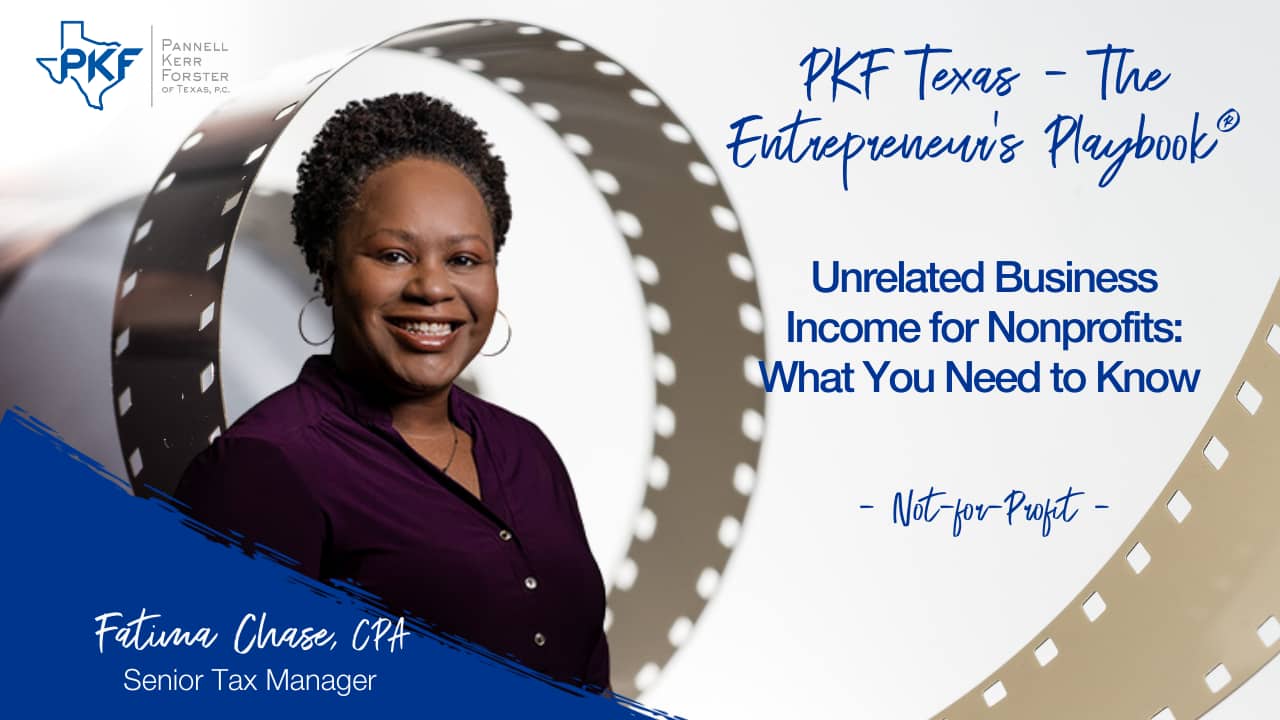Unrelated Business Income for Nonprofits: What You Need to Know

Unrelated Business Income (UBI) is still a critical consideration for nonprofits—but how does it impact different organizations? In this episode of Entrepreneurs Playbook, PKF Texas’ Fatima Chase, CPA, Senior Tax Manager, and one of our Approachable Advisors™, joins Jen Lemanski to discuss how UBI affects 501(c)(3) charities and 501(c)(7) social clubs. Learn about investment income, non-member income, and the potential risks of losing tax-exempt status.
Transcript Below
Jen: This is the PKF Texas – The Entrepreneur’s Playbook® and I’m here with Fatima Chase, a tax manager and one of the Approachable Advisors® on our Not-for-Profit team. Fatima, welcome to the Playbook.
Fatima: Thanks for having me.
Jen: With prior interviews that I’ve done with our Not-for-Profit team, they’ve talked about unrelated business income and how that relates to not for profits. I guess my main question is, is that still a thing? Do they need to pay attention to it? What can you tell us about that?
Fatima: Yes, that’s still a thing. Okay, good, good. It’s still a thing. And it’s, you know, becoming even more prevalent. Organizations are trying to fund their missions. And you know, we normally talk about it as it relates to 501c3 charitable organizations, but we’re starting to see it a lot more with our social clubs, which are 501s.
Fatima: Those would include the country clubs, the sororities and the fraternities.
Jen: So do you handle it a different way for those types of organizations?
Fatima: Sometimes they’re a little bit different in what’s included in ubi. So previously we’ve discussed that unrelated business income is a regularly carried on trader business. And normally it doesn’t include investment income such as interest and dividends for 501s. However, for 501s it does include investment income. Additionally, we also have to include what is called non member income when it comes to 501s.
Jen: So now is investment income part of that and what does that look like?
Fatima: So investment income is, like I said, interest and dividends. It would be on your savings, your investments in stocks and bonds. And I want to note that the fact that it’s being funded by member income or that the return is used for the exempt purpose of the club doesn’t negate it from being included in unrelated business income.
Jen: Okay, now, is there anything else that not for profits should know?
Fatima: Well, the non member income, I do want to provide the definition for that. And that’s the income that’s not coming from the members. So membership dues, membership fees, membership assessments, those would be member income. And income that’s coming from say sales of foods and beverage to non members or gym membership to non members of the club facilities. Those would be considered non member income. And you know, you asked about, well, what else do they need to know? And while non member income and investment income will invite some unwanted tax, what one of the bigger problems is an excessive amount of those types of income could cause them to be revoked of their exempt status.
Jen: Is that something we can work with nonprofits on, either through forecasting or taking a look at prior years and seeing how that could impact them moving forward.
Fatima: Oh, yeah, exactly.
Jen: Okay, perfect. Well, I think we’ll get you back to talk about some more not-for-profit topics in the future. Sound good?
Fatima: Sounds good.
Jen: All right. This has been another thought leader production brought to you by PKF Texas – The Entrepreneur’s Playbook®. For more information about this and other topics, visit pkftexas.com/NotForProfit. Tune in next week for another chapter.
